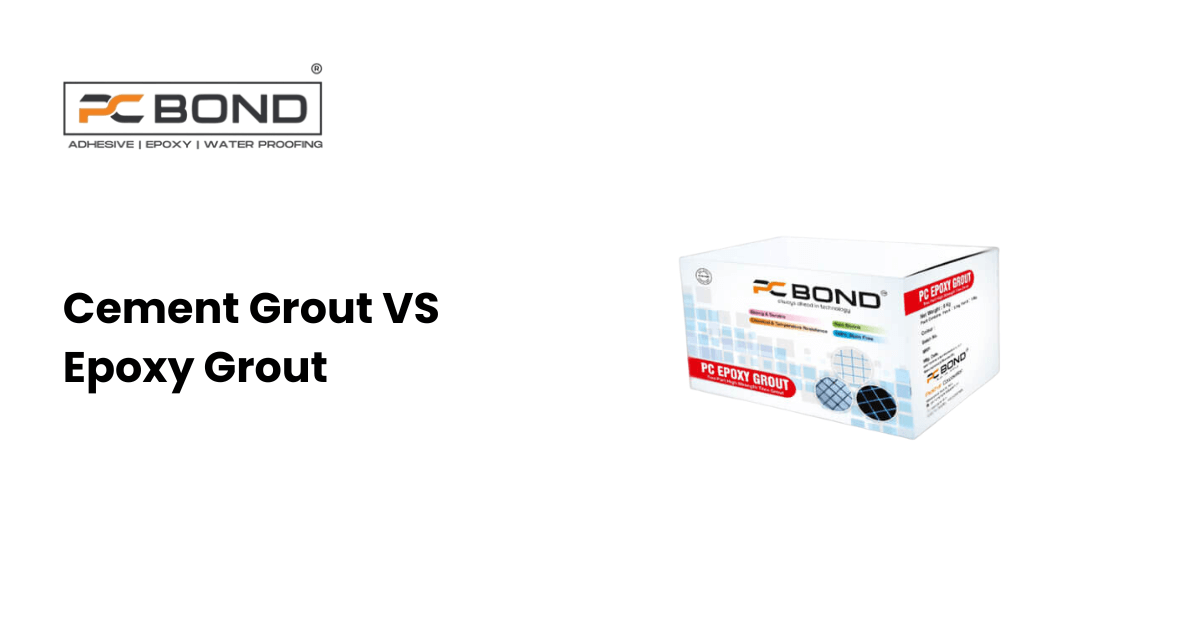
What is grout?
Grout is a thick liquid that can be used to reinforce existing constructions or to fill gaps. It is typically a blend of water, cement, and sand and is used for sealing joints between tiles, embedding rebar in masonry walls, connecting precast concrete pieces, and pressure grouting. In the home, grout is frequently used to fill in shower floor tiles and kitchen tiles.
Types of Grout?
- A cement-based mixture is used to make conventional grout. When it gets wet, it actually absorbs water because it is not waterproof. Moreover, it is easily stain-absorbing, as anyone who has washed grout can attest.
- Epoxy grout is created by mixing epoxy resins with filler powder. This renders epoxy grout stain free and makes it waterproof. Because of its longevity, it is the best option for flooring, splashbacks, and high-traffic areas.
How is epoxy grout unique?
Epoxy grout is perfect for use in moist places like showers since it won’t crack, shrink, or change colour. Also, it has a high level of resistance to the harsh chemicals in cleaning supplies. Moreover, epoxy grout does not discolour like conventional cement grout does.
Due to its advantages over cement grout, epoxy grout is becoming more frequently utilised by tile installers, notably in tiled showers and floors.
What are the Differences Between Cement Grout And Epoxy Grout?
- Epoxy grout is formed from epoxy resins and a filler powder, as opposed to cement grout, which is made from a cementitious powder mixture.
- Epoxy grout is incredibly resilient and nearly stain proof.
- Epoxy grout is waterproof while regular cement grout is not. As a result, cement grout can easily absorb water while wet and discolour. Epoxy grout is waterproof and better suited to more abrasive cleaning agents since it is constructed of two distinct resins combined with a filler.
- Compared to cementitious grouts, epoxy thin sets offer stronger bonds and better chemical resistance.
EPOXY GROUT
What are the Benefits?
- Although epoxy grout offers several advantages, it should be noted that it is more difficult to work with than conventional grout and has a tendency to become plastic sooner, which some homeowners dislike.
- The cost of purchasing it is higher, and most tilers charge more for using epoxy grout than normal grout.
- Outside corners where the tile wraps around a wall, kerb, or shower niche are very simple to shape with regular grout.
- Epoxy grout requires more time to firm up in the grout joint, making it more difficult to produce the same appearance.
- Epoxy grout requires a lower amount of mix and takes less time to work with than ordinary grout since it sets up more quickly.
- To assist remove any more resin residue from your tile surfaces when using epoxy grout, an acid wash is also necessary. Some epoxy grouts are specifically made for glass.
There are numerous brands that offer both ordinary epoxy and glass epoxy. The filler component of the grout is where the two differ from one another. Glass tile filler is finer so as not to scratch fragile tiles.
- The time required to install and clean epoxy grout compared to conventional grout and the cost of the grout, which can be 3 to 5 times more expensive, are two more significant differences between the two types of grout.
Where Should Epoxy Grout Be Used In Place Of Cement Grout.
No phase of the process is the same when using epoxy grout as it is when using conventional cement grout. Epoxy grouting has its own set of guidelines, including everything from mixing to applying to cleaning.
- Epoxy grout is recommended for use in tiled floors and showers because it adds still another layer of defence against moisture penetrating beneath the tile, where another layer of defence in the form of waterproofing already exists.
- Another application for epoxy grout would be backsplash tile above vanities.
- Epoxy grout is popular due to its uniform hue. Epoxy grout has a consistent colour that comes from the filler.
Drawbacks of Epoxy Grout.
- Using epoxy grout is more challenging than using regular grout. It must be applied gradually because it takes longer to apply and settles quickly.
- Before employing epoxy grout, the tiles must be thoroughly cleaned.
- Porous surfaces, such natural stone, should be sealed before grouting since epoxy might discolour them.
- Epoxy can also have a slightly plastic appearance as opposed to the typical grout’s rough cement appearance.
- Any epoxy residue that is left on tiles after application will have a glossy sheen, thus it must be properly washed off right once.
- Epoxy grout is less forgiving and draws attention to flaws in your tiling because of its gloss. Moreover, epoxy grout has a much higher cost.
Conclusion
So this concludes the advantages of Epoxy Grout over Cement Grout. Epoxy grout can give your project a great look if used by an experienced masonry contractor. To know more about Epoxy Grout and get the best epoxy grout contact today.
